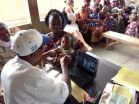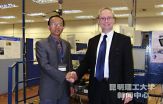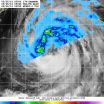(Press-News.org) As a child in southern California, Ryan Rykaczewski spent a fair amount of time on his grandfather's boat, fishing with him off the Pacific coast near Los Angeles. At the time, he didn't think there was much rhyme or reason to their luck on the water.
"Sometimes we'd catch a lot of fish and sometimes we didn't," he says. "I just thought it was chaotic, that we could never understand what was going on."
But education changed his mind. Now an oceanographer and assistant professor at the University of South Carolina, he's working to understand the many factors that determine how plentiful fish might be in the sea.
And he's part of a team that just found a way to look deep into the ocean's past. They've shown that natural processes can cause dramatic year-to-year drops in fish populations and growth rates and raised questions about whether human activities might be making those declines more frequent.
Upwelling means phytoplankton, the perfect 'sea food'
The focus of the research is the California current, which stretches from Washington state to the Baja peninsula and is one of a handful of coastal waters on Earth from which an inordinately large portion of the world's fish harvest originates.
"There's the California current, the Humboldt current off the coast of Peru and Chile, the Canary current off the coast of Portugal and Morocco, and the Benguela current off of South Africa and Namibia," Rykaczewski says. "They're all along the western edges of the major continents, and because of the way the air circulates on the globe, all of these regions have winds that blow towards the equator. Couple that with the rotation of the Earth, and you get a certain type of vertical flow in the water column called upwelling."
The upwelling brings cold, nutrient-rich water to the surface. Phytoplankton thrive in those waters, as does every species higher on the food chain.
"These four relatively small areas end up providing about a third of the world's fish catch," he says. "That's huge for such a relatively small surface area of the planet."
Trouble off the California coast
That makes recent dips in the yearly Pacific catch worrisome. "The past 30 years have been relatively extreme," says Rykaczewski. Climate models predict lessening of the coastal winds that underpin the California current, he adds, so people are wondering if recent drops in fish harvest might be the new norm.
It's hard to answer that question, though, given the limited time period for which hard data are available. Because instrumental records date back just a little over 60 years, the team decided to look at landlubbing proxies that can yield hundreds of years of annual data points — namely, trees.
They first used three measurements in the instrumental record (sea level height, a measure of coastal wind strength, and the pressure difference between Australia and the northeast Pacific) to calculate a single number to represent the winter marine climate for each year. Summer is when winds blow strongest and upwelling is most prevalent, but the major cause of a diminished fish catch is actually low upwelling in the winter, Rykaczewski says.
By comparing the winter climate index number with observed biological activity of a variety of marine and terrestrial species (recorded since the early 1970s), the team was able to establish a tight connection between the winter marine climate, marine biological productivity, terrestrial climate and terrestrial biological productivity. In part, the team showed that high-pressure systems off the coast, which favor upwelling and consequently make fish grow like gangbusters, also block storms from moving inland, depriving the coast of rainfall.
In other words, slow tree growth means lots of fish, and vice versa.
Looking back over the centuries
They then used tree rings to extrapolate back in time almost 600 years. They found that very low winter upwelling and its concomitant diminished growth of marine species had, in fact, occurred in the distant past, and with equal severity.
"What we've experienced recently is extreme, but it's not unprecedented," Rykaczewski says. "It's not outside the envelope of what we've seen over the last six centuries. One bad year doesn't necessarily mean that the ecosystem is going to hell in a handbasket, because we've seen that this has happened in the past, and the ecosystem does bounce back."
One trend bears watching in coming years, though. The team of scientists from across the country, which just published their work in the journal Science, reports that the frequency of exceptionally low upwelling has increased recently.
"That is perhaps something to be concerned about in terms of climate change. We need to see if it persists in the future," Rykaczewski says. "Increased variability of the marine ecosystem is one projected consequence of anthropogenic global climate change, but for now we can't nail down that the increased variability we've seen recently is specifically the result of global climate change. It's been highly variable recently, but it's also been highly variable during other periods in the past 600 years."
Seafood and survival
Finding connections between the marine world and the terrestrial one was a particularly interesting aspect of the project, Rykaczewski says, and the ability to use the connections to look into the ocean's past should prove profitable in other geographic locations. Past marine productivity and variability have been estimated from sediments and fossilized coral elsewhere, he says, but those methods only resolve time points to a decade or more and, in the case of coral, are limited to tropical waters.
And the results are more than purely academic.
"There are a number of countries, usually poorer ones, that depend a lot on fisheries for their protein source and their economy," Rykaczewski says. "It's specifically in these regions where you catch so many fish that climate can have a really big impact on their society."
INFORMATION:
Poor fish harvests more frequent now off California coast
Fish population crashes have occurred occasionally since early 1400s, but more often in past 60 years
2014-09-26
ELSE PRESS RELEASES FROM THIS DATE:
Scanning babies' fingerprints could save lives
2014-09-26
Each year 2.5 million children die worldwide because they do not receive life-saving vaccinations at the appropriate time.
Anil Jain, Michigan State University professor, is developing a fingerprint-based recognition method to track vaccination schedules for infants and toddlers, which will increase immunization coverage and save lives.
To increase coverage, the vaccines must be recorded and tracked. The traditional tracking method is for parents to keep a paper document. But in developing countries, keeping track of a baby's vaccine schedule on paper is largely ineffective, ...
Decision analysis can help women make choices about breast reconstruction
2014-09-26
September 26, 2014 – Decision analysis techniques can help surgeons and patients evaluate alternatives for breast reconstruction—leading to a "good decision" that reflects the woman's preferences and values, according to an article in the October issue of Plastic and Reconstructive Surgery®, the official medical journal of the American Society of Plastic Surgeons (ASPS).
The special topic article by Mia K. Markey, PhD, and colleagues of The University of Texas at Austin and The University of Texas MD Anderson Cancer Center, Houston, introduces plastic surgeons to the ...
New tool assesses skill development in robotic microsurgery, reports Plastic and Reconstructive Surgery
2014-09-26
September 26, 2014 – A new standardized assessment provides a useful tool for tracking surgeons' progress as they develop the skills needed to perform robot-assisted microsurgery, reports a study in the October issue of Plastic and Reconstructive Surgery®, the official medical journal of the American Society of Plastic Surgeons (ASPS).
"The Structured Assessment of Robotic Microsurgical Skills (SARMS) is the first validated instrument for assessing robotic microsurgical skills," according to the report by ASPS Member Surgeon Dr Jesse C. Selber of the University of Texas ...
Disease without borders
2014-09-26
In a paper published this week online in Global Society, researchers with University of California, San Diego School of Medicine and the Urban Studies and Planning Program, also at UC San Diego, present a bioregional guide that merges place-based (territorial) city planning and ecosystem management along the United States-Mexico border as way to improve human and environmental health.
Issues like climate change, economic crisis, natural disasters and disease outbreaks do not stop at national borders, compelling public health officials, academics and researchers to think ...
Cardiology leaders call for global prevention of heart disease, stroke
2014-09-26
WASHINGTON (Sept. 29, 2014) — Heart disease and stroke contribute to 30 percent of global deaths, more than all infectious and parasitic diseases combined, and 11 cardiovascular organizations are calling for the United Nations to address prevention of heart disease and other non-communicable diseases.
In a statement published in the Journal of the American College of Cardiology and other cardiology journals, the World Heart Federation's Global Cardiovascular Disease Taskforce—which is comprised of cardiologists and health advocates from the World Heart Federation, African ...
Progress in materials science
2014-09-26
RESEARCHERS at the University of Huddersfield have collaborated with a colleague at a leading Chinese university to produce a detailed appraisal of a complex new welding technique that could be increasingly valuable to modern industry.
Professor Andrew Ball (pictured below) and his colleague Dr Fengshou Gu, of the University of Huddersfield's Centre for Efficiency and Performance Engineering, teamed up with Professor Xiaocong He of Kunming University of Science and Technology's (KUST) Innovative Manufacturing Research Centre in order to investigate the technique ...
Severe periodontitis: Sixth most prevalent health condition in the world
2014-09-26
Alexandria, Va., USA – The International and American Associations for Dental Research (IADR/AADR) have published a paper titled "Global Burden of Periodontitis: A Systematic Review and Meta-Regression." The manuscript, by lead researcher Wagner Marcenes (Queen Mary University of London, Institute of Dentistry, Barts and The London School) is published in the OnlineFirst portion of the IADR/AADR Journal of Dental Research (JDR).
The purpose of this study was to consolidate all epidemiological data about severe periodontitis and subsequently to generate internally consistent ...
Morphed images of Hollywood celebrities reveal how neurons make up your mind
2014-09-26
An international team of scientists, involving Professor Rodrigo Quian Quiroga, director of the Centre for Systems Neuroscience and Head of Bioengineering at the University of Leicester, has shown how individual neurons in the human brain react to ambiguous morphed faces.
For this, the researchers used images of celebrities, such as Angelina Jolie and Halle Berry, morphed together to create an ambiguous face which test subjects were asked to identify.
The study found that for the same ambiguous images, the neurons fired according to the subjective perception by the ...
NASA sees Tropical Storm Kammuri's spiral bands of soaking thunderstorms
2014-09-26
Tropical Storm Kammuri continues to strengthen on its north-northwestern track through the Northwestern Pacific Ocean and NASA's TRMM satellite identified a band of thunderstorms containing heavy rainfall northwest of the storm's center. Meanwhile NASA's Aqua satellite got a look at the entire storm and saw that those bands of storms circled the entire storm.
The Tropical Rainfall Measuring Mission or TRMM satellite flew over the northern half of Tropical Storm Kammuri on Sept. 26 at 1:44 a.m. EDT and the Precipitation Radar instrument saw a strong band of thunderstorms ...
UB study: COPD patients breathe easier with Lung Flute
2014-09-26
BUFFALO, N.Y. – Patients with chronic obstructive pulmonary disease (COPD) report improved symptoms and health status when they use a hand-held respiratory device called the Lung Flute®, according to a new study by the University at Buffalo. Usually caused by smoking, COPD, which includes chronic bronchitis and emphysema, is the third leading cause of death in the U.S.
The Lung Flute, manufactured by Medical Acoustics, (Buffalo), uses sound waves to break up mucus in the lungs. The device allows patients to clear lung mucus simply by blowing into the hand-held respiratory ...
LAST 30 PRESS RELEASES:
Breaking the efficiency barrier: Researchers propose multi-stage solar system to harness the full spectrum
A new name, a new beginning: Building a green energy future together
From algorithms to atoms: How artificial intelligence is accelerating the discovery of next-generation energy materials
Loneliness linked to fear of embarrassment: teen research
New MOH–NUS Fellowship launched to strengthen everyday ethics in Singapore’s healthcare sector
Sungkyunkwan University researchers develop next-generation transparent electrode without rare metal indium
What's going on inside quantum computers?: New method simplifies process tomography
This ancient plant-eater had a twisted jaw and sideways-facing teeth
Jackdaw chicks listen to adults to learn about predators
Toxic algal bloom has taken a heavy toll on mental health
Beyond silicon: SKKU team presents Indium Selenide roadmap for ultra-low-power AI and quantum computing
Sugar comforts newborn babies during painful procedures
Pollen exposure linked to poorer exam results taken at the end of secondary school
7 hours 18 mins may be optimal sleep length for avoiding type 2 diabetes precursor
Around 6 deaths a year linked to clubbing in the UK
Children’s development set back years by Covid lockdowns, study reveals
Four decades of data give unique insight into the Sun’s inner life
Urban trees can absorb more CO₂ than cars emit during summer
Fund for Science and Technology awards $15 million to Scripps Oceanography
New NIH grant advances Lupus protein research
New farm-scale biochar system could cut agricultural emissions by 75 percent while removing carbon from the atmosphere
From herbal waste to high performance clean water material: Turning traditional medicine residues into powerful biochar
New sulfur-iron biochar shows powerful ability to lock up arsenic and cadmium in contaminated soils
AI-driven chart review accurately identifies potential rare disease trial participants in new study
Paleontologist Stephen Chester and colleagues reveal new clues about early primate evolution
UF research finds a gentler way to treat aggressive gum disease
Strong alcohol policy could reduce cancer in Canada
Air pollution from wildfires linked to higher rate of stroke
Tiny flows, big insights: microfluidics system boosts super-resolution microscopy
Pennington Biomedical researcher publishes editorial in leading American Heart Association journal
[Press-News.org] Poor fish harvests more frequent now off California coastFish population crashes have occurred occasionally since early 1400s, but more often in past 60 years




